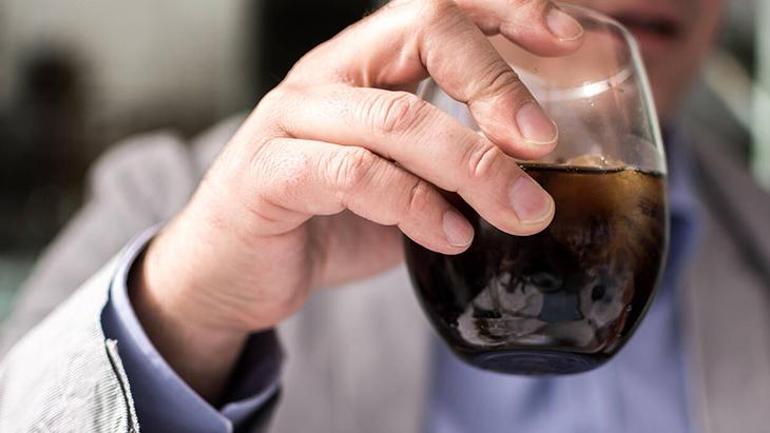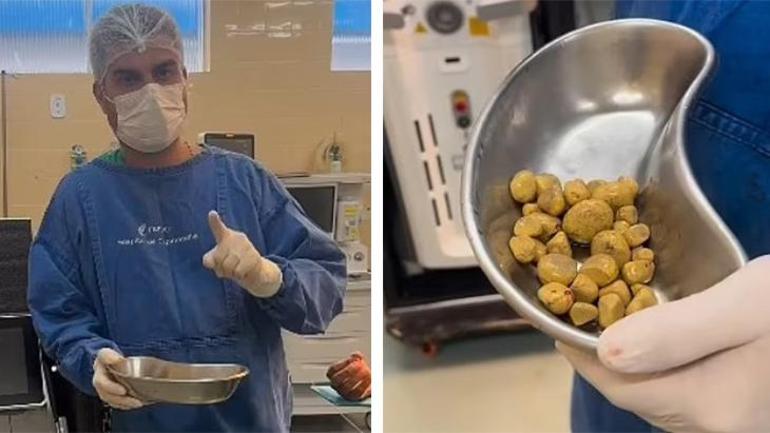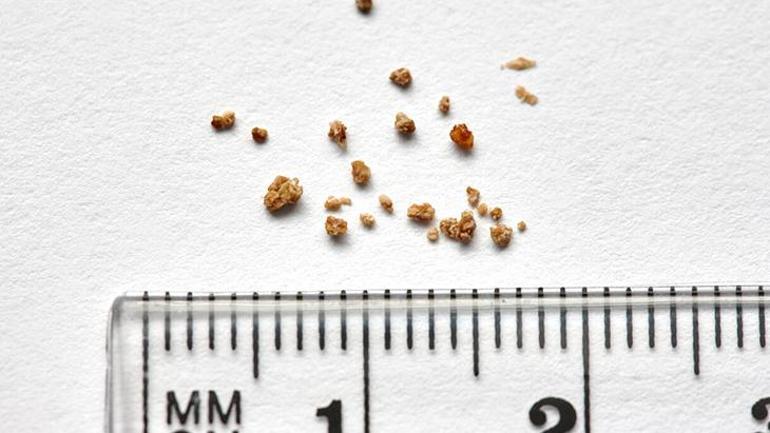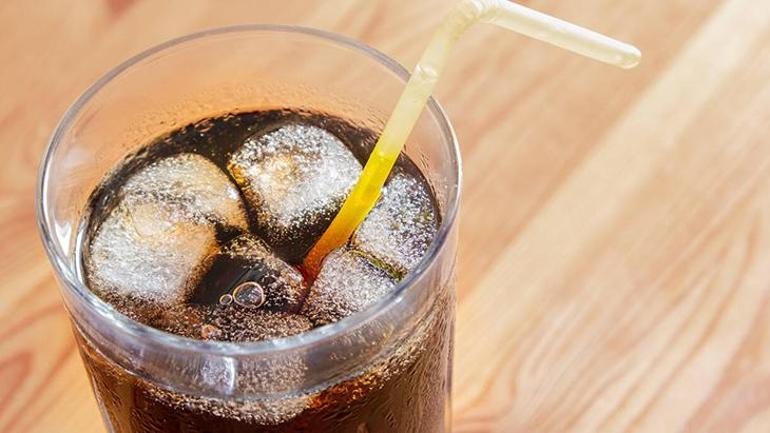He drank 3 liters of cola instead of water! What he experienced is terrible, he has been breaking records for days: 'He has turned into a field'

Betül Yasemin Keskin / Milliyet.com.tr - Social media was rocked by a Brazilian doctor's post the other day. The video, which was watched by 8.5 million people and quickly shared, featured Urologist Dr. Thales Andrade, who works in Brazil. A urologist working in Brazil encountered perhaps one of the most interesting cases of his life during an ordinary examination day. A young man who drank nearly 3 liters of cola a day entered the clinic with severe kidney pain. However, no one could have predicted what was about to happen.

35 STONES CAME OUT OF HIS BLADDER
Urologist Dr. Thales Andrade immediately began his examinations after listening to his patient. He was speechless when he saw the imaging results. The young man's bladder had turned into a field of rocks. When he was taken into surgery, Dr. Andrade removed exactly 35 large stones from his patient's bladder. Dr. Andrade shared this extraordinary case on his social media account and the video was viewed by 8.5 million people in a short time. Not only the image of the stones in the video shocked everyone, but also the reason behind it: Coke addiction.
With this case, Andrade reminded us once again how excessive consumption of sugary and fizzy drinks damages the kidneys. He said that drinks containing phosphoric acid in particular create an acidic environment in the kidneys, causing calcium to precipitate in the urine and turn into stones over time. Dr. Thales Andrade, who showed some of the 35 stones he removed from his patient's bladder in a social media post, said , "Kidney health begins with the choice of drinks we drink on a daily basis." While his patient regained his health, millions of people who watched this video commented that they decided to reconsider their drink preferences. So is this issue only a problem in Brazil? Unfortunately, no. The consumption of cola and similar drinks is quite high in Turkey as well. We spoke to Urology Specialist Assoc. Dr. Emre Salabaş about the issue in this context.
Urology Assoc. Prof. Dr. Emre Salabaş began his explanations by saying that geography, climate, diet and genetic factors are effective in the formation of kidney stones . Urology Specialist Assoc. Prof. Dr. Salabaş said, " Factors that increase the risk of kidney stones include having kidney stones in the family, living in a hot climate, and having genetic and systemic diseases that increase the formation of stones . " Stating that the hereditary rate of kidney stones is 45 percent , Assoc. Prof. Dr. Salabaş provided information that genetic and metabolic disease research can be performed especially in people who have recurring kidney stones, those who involve both kidneys, and those who have a family history of kidney stones. Stating that systemic diseases that increase the risk of stones include metabolic syndrome, hyperparathyroidism, osteoporosis, polycystic kidney, gastrointestinal diseases or those who have undergone obesity surgery, excessive vitamin D, spinal cord injury-neurogenic bladder, Urology Specialist Assoc. Emre Salabaş said, "In addition, if there is a problem in the structure of the kidney- urinary canals (such as renal outflow tract stenosis) or if there are conditions that reduce the rate of urine passage, such as prostate enlargement, the formation of stones may increase ."

Commenting on Dr. Thales Andrade's video post, Urology Specialist Assoc. Prof. Dr. Emre Salabaş referred to a study conducted on the subject and used the following sentences: "In a study investigating the effect of carbonated drinks on kidney stone formation, they examined 1009 men who consumed one glass or more of carbonated drinks per day. Half of these men completely quit carbonated drinks. A significant decrease in new stone formation was seen in the group that quit carbonated drinks over the course of 3 years. In the study, it was determined that stone formation decreased in men who consumed phosphoric acid-containing carbonated drinks in particular, while it was observed that carbonated drinks containing citrate did not have such an effect. The conclusion to be drawn from this could be that if possible, we should not consume carbonated drinks at all, but if we do, we should at least consume those containing citrate."
'YOU CAN UNDERSTAND THE SITUATION BY LOOKING AT THE COLOR OF THE URINE'
Assoc. Prof. Dr. Salabaş conveyed that the recommended amount of fluid to prevent kidney stones is between 2.5-3 liters a day and emphasized that compared to the water we drink, if the weather is not too hot, we should excrete an average of 2-2.5 liters of urine. He stated that the need for fluid intake is related to a person's weight, air temperature, and water lost through sweating . He said that overweight people, those who sweat excessively, those who do intense physical work, and those who are in hot environments should increase their fluid intake. If your urine is light yellow to transparent, you can understand that you are taking in enough water, however, if your urine is dark in color and it burns when exiting, you can understand that you are drinking too little water with these symptoms. Urology Specialist Assoc. Prof. Dr. Emre Salabaş, "Especially citrus juices are seen to have protective effects against kidney stones thanks to their citrate and bicarbonate content. While orange juice has the most effect, lemonade is recommended second, and grapefruit is recommended. Consumption of carbonated and sugary drinks can increase the formation of kidney stones. Contrary to what is thought, consumption of tea and coffee has not been shown to have any effect on stone formation."

So is someone who has passed a kidney stone once always at risk throughout their life? Assoc. Prof. Dr. Salabaş said that there is a fifty percent chance of a stone forming again throughout their life in someone who has passed a kidney stone once, had it broken or had surgery for the stone. He emphasized the importance of a balanced diet for those who have passed kidney stones and said that while a vegetable and fiber-based diet is recommended, salt and protein (animal food) intake should be restricted. Assoc. Prof. Dr. Salabaş, who stated that foods containing up to 1 gram of calcium should be consumed per day, provided information that daily salt (NaCL) intake should be limited to 4-5 grams and animal protein intake should be limited to 80-100 grams per day. Assoc. Prof. Dr. Salabaş, who stated that most kidney stones in our country are formed from calcium oxalate stones, said, " Therefore, consumption of oxalate-rich foods and excessive vitamin C supplements should be avoided. However, there should definitely be no restriction on calcium intake. People with kidney stones should maintain their weight, increase their daily exercise, and reduce excessive fluid loss if any."
'THERE ARE MORE THAN 50 EXTRACTS SAID TO DISSOLVES KIDNEY STONES'
Since kidney stone formation and passing kidney stones is a troublesome and painful process in every sense, you may have heard countless health tips about this process. The most common tip among these is to consume gilaburu fruit. Can consuming gilaburu fruit be beneficial when passing kidney stones? Assoc. Prof. Dr. Salabaş made the following statements:
"There are more than 50 ingredients that have been claimed to break down or dissolve kidney stones. Among these are plant extracts such as gilaburu, cranberry, green tea, tribulus terrestris, pomegranate, chanca piedra (a plant native to South America). Although they are sometimes recommended because they have no known harm, more studies are needed to say whether they have clear benefits."

IT MAY ALSO DISSOLVES ON ITS OWN! IF NOT TREATED, IT WILL END UP IN DIALYSIS
Underlining that kidney stones that are not treated and block the urinary tract can cause complaints such as very severe side pain, fever, nausea, burning sensation in urine, bleeding and frequent urination, Assoc. Prof. Dr. Salabaş said, " In cases where the blockage continues and the urinary tract does not open, kidney failure and even the need for dialysis may occur in the medium/long term . Since timing is critical, urgent intervention, especially for kidney stones that have caused obstruction, is important to protect kidney functions. Patients who are overweight, have frequent urinary tract infections, have a single kidney, and have a non-functioning bladder (neurogenic bladder) are at extra risk for developing kidney failure after stones ," and cleared up the question marks in minds.
Concluding his explanations by explaining the easiest method to treat kidney stones, Assoc. Prof. Dr. Emre Salabaş said, " We can reduce kidney stones with the diet, lifestyle and fluid intake we explained above. It is based on the principle that small stones, commonly known as kidney stone dissolution, pass by themselves without being noticed. However, for people who have passed stones, had stones broken or had surgery for this, special stone analyses and genetic analyses can be recommended for personalized treatments." Assoc. Prof. Dr. Salabaş stated that making general recommendations without knowing the type of stone and the person's metabolic evaluation can increase stone formation instead of reducing it or cause other problems. "In addition, it is vital to detect stones that cause obstruction and inflammation in the kidney and urinary tract and to intervene if necessary. With developing technology, stones in the kidney can be intervened with fiber optic imaging methods and laser technology."
milliyet




